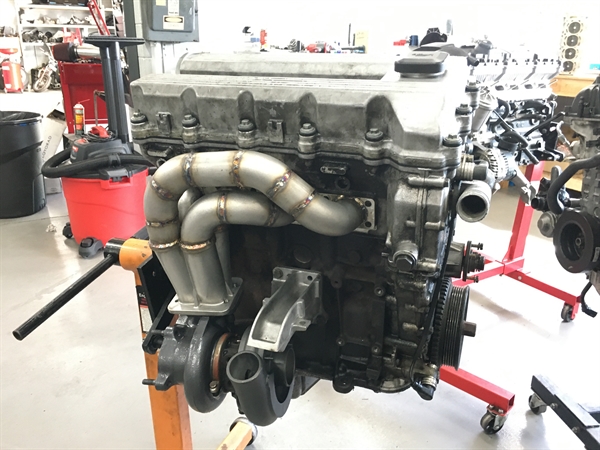BMW 318ti: Where to Locate the most effective Bargains on Components and Add-on
BMW 318ti: Where to Locate the most effective Bargains on Components and Add-on
Blog Article
Essential Factors To Consider for Selecting the Finest Engine for Your Demands
In the realm of choosing the ideal engine to satisfy your demands, numerous crucial elements need careful consideration to ensure ideal efficiency and effectiveness. From the nuanced equilibrium between power and performance to the often-overlooked elements of upkeep and service demands, each aspect plays a crucial duty in determining the most suitable engine for your specific needs.
Power and Performance
When assessing engines for ideal performance, it is important to prioritize both power outcome and effectiveness. Power outcome determines the ability of an engine to generate energy, which directly influences its efficiency. A high power result is necessary for requiring jobs such as high-speed demands or durable applications. It makes sure that the engine can manage the work properly and successfully. However, power alone is not sufficient; efficiency plays a significant role in identifying the general performance of an engine. Effectiveness refers to how well the engine transforms fuel right into functional energy. A more reliable engine will deliver far better mileage, reduced discharges, and reduced operating expense. Striking the ideal balance in between power output and performance is crucial to selecting an engine that satisfies your specific demands. It is vital to consider variables such as the intended use the engine, environmental influence, and long-term price implications when making this choice. By thoroughly reviewing both power and efficiency, you can pick an engine that delivers ideal efficiency and meets your demands successfully.
Fuel Effectiveness and Economic Situation
In the realm of engine choice, the factor to consider of gas performance and economic situation holds paramount significance. Fuel effectiveness refers to the engine's capability to transform gas into power with marginal waste, straight influencing operating expense and ecological sustainability. bmw 318ti. When choosing an engine, evaluating its fuel economy is vital to establish lasting financial savings and ecological effect. Engines with greater gas performance not just minimize fuel expenses yet additionally lower carbon exhausts, adding to a greener operation.

Compatibility and Application
Considering the fuel efficiency and economic situation of an engine, the next crucial facet to address is its compatibility and application within particular functional contexts. Compatibility refers to just how well the engine integrates with the general system or tools it powers. It includes variables such as physical measurements, placing options, electric user interfaces, and control systems. Guaranteeing compatibility is important to avoid concerns such as overheating, vibrations, or power inequalities (bmw 318ti).
Moreover, the application of the engine is equally crucial. Various engines are designed for particular functions, whether it be commercial equipment, aquatic vessels, automobiles, or power generators. Understanding the designated application enables for the option of an engine that can supply the required power output, torque, and operational qualities. A high-revving engine created for efficiency cars and trucks would not be suitable for heavy-duty construction equipment that requires high torque at low rates.
Maintenance and Service Needs
Upkeep and service demands play a crucial role in making sure the long life and optimum performance of an engine. Routine maintenance is crucial to prevent break downs, prolong the life-span of the engine, and keep its efficiency. When choosing an engine, it is necessary to think about the supplier's advised upkeep schedule and the availability of service centers or qualified specialists.
Aspects such as the regularity of oil modifications, filter substitutes, basics and general assessments can dramatically influence the engine's efficiency. Some engines might need even more regular servicing based on their design and usage, while others may have longer intervals between upkeep checks. It is essential this to stick to these solution demands to prevent expensive repair work and unforeseen downtime.

Cost and Budget Factors To Consider
When choosing an engine for a particular application,Spending plan constraints usually play a significant function in the decision-making process. When taking into consideration the cost and spending plan implications of picking an engine, it is necessary to analyze not only the first purchase rate but likewise the long-term costs related to maintenance, gas consumption, and prospective upgrades or fixings. It is important to strike an equilibrium between the in advance price of the engine and its overall lifecycle expenses to make certain that the chosen engine stays monetarily sustainable throughout its functional life-span.
Elements such as fuel performance, reliability, and longevity can directly influence the overall cost of possession of an engine. While a more pricey engine may have greater in advance costs, it might potentially result in reduced maintenance and gas expenses over time, hence providing far better value in the lengthy run.
Final Thought

Fuel effectiveness refers to the engine's capacity to convert fuel right into power with minimal waste, directly influencing operating prices and environmental sustainability.Aspects affecting gas efficiency include engine design, combustion performance, and total performance optimization. Additionally, choosing the proper gas kind and quality as recommended by the engine producer can additionally boost performance and prolong engine lifespan.
Engines with good service functions and conveniently offered components can lower upkeep prices and minimize the time the engine is out of operation - bmw 318ti. It is essential to strike a balance between the in advance expense of the engine and its general lifecycle expenses to make sure that the selected engine stays economically sustainable throughout its operational lifespan
Report this page